Connecticut Drives Towards a Greener Future with Zero-Emissions Car Plan Set for 2035
Connecticut's commitment to becoming zero emission by 2035 stems from a growing recognition of the urgent need to address climate change and its adverse effects on the environment and public health. As a state that has witnessed the impact of extreme weather events, rising sea levels, and worsening air quality, Connecticut has taken a proactive stance to mitigate its greenhouse gas emissions. By transitioning to zero emissions, the state aims to significantly reduce its contribution to global warming and be a part of the collective effort to limit global temperature rise. Furthermore, embracing clean and sustainable energy sources not only helps combat climate change but also promotes innovation and economic growth in the green technology sector. By setting an ambitious target, Connecticut is signaling its commitment to fostering a greener and more sustainable future for its residents and generations to come.
In addition to environmental concerns, the push towards zero emissions aligns with Connecticut's efforts to improve public health and reduce pollution-related illnesses. High levels of air pollution, primarily from transportation and industrial sources, have been linked to respiratory diseases and other health issues. By transitioning to electric vehicles, promoting renewable energy adoption, and implementing stricter emissions regulations, Connecticut aims to improve air quality, especially in urban areas with heavy traffic. This transition will not only make the state a healthier place to live but also reduce healthcare costs associated with treating pollution-related illnesses. Embracing zero emissions is a multifaceted approach that addresses both environmental and public health challenges, making it a compelling and vital goal for Connecticut's sustainable future.
Monjasa, one of the world's top 10 marine fuel suppliers, is working to establish a sustainable and scalable biofuel option for the maritime industry in Latin America.
In the maritime shipping sector, climate change is a pressing concern, and recent developments reflect both hope and challenges.
Calstart, a non-profit environmental advocacy organization, has released a report on phasing in charging infrastructure for zero-emission, battery-electric commercial trucks.
The shipping industry may struggle to secure enough carbon-neutral fuels to meet the 2030 maritime emission targets, according to DNV.
The U.S. government's ambitious plan to cut greenhouse gas emissions from passenger vehicles is facing skepticism about its feasibility and whether it goes far enough.
Connecticut's commitment to becoming zero emission by 2035 stems from a growing recognition of the urgent need to address climate change and its adverse effects on the environment and public health.
Amazon reports a decrease in carbon emissions for the first time since the company began reporting the figure.
The Diesel Technology Forum (DTF), a trade group representing suppliers in the diesel engine supply chain, is positioning diesel engines as a leading force in achieving a cleaner future for the trucking industry.
The number of near-zero-emissions diesel trucks on the road increased by 10.2% between 2021 and 2022, according to the Diesel Technology Forum.
Daimler Truck, the truck division of Daimler AG, has outlined its plans for a transition to zero-emissions powertrains and projected revenue growth of 40%-60% in the second half of the decade.
A report by Breakthrough, a transportation management technology provider, reveals that consumer demand for sustainable products is driving shippers and carriers to adopt more eco-conscious practices.
CALSTART, a clean transportation consortium based in Pasadena, California, has launched the Cal Fleet Advisor (CFA) program to assist trucking fleets in transitioning to zero-emission vehicles.
Mars and DHL have collaborated to establish new logistics centers in the UK, utilizing advanced technology to reduce CO2 emissions by 7.7%.
Walmart suppliers have made significant progress toward achieving the retailer's goal of reducing greenhouse gas emissions from its value chain.
Global temperatures have risen by 1.1 degrees Celsius above preindustrial levels, leading to increased CO2 concentrations in the atmosphere not seen in millions of years.
BloombergNEF predicts that global electric vehicle sales will more than double by 2026, reaching around 27 million units, driven by strong sales in China and the US.
Tracking and reducing Scope 3 emissions in supply chains is a major focus for companies like Nike, McCormick, and The Estée Lauder Companies.
Toyota has released a study suggesting that electric vehicles (EVs) may not be necessary to significantly reduce carbon emissions.
DHL and Formula 1 are partnering to enhance sustainable logistics by introducing a fleet of 18 biofuel-powered trucks for European Formula 1 races by 2023.
Tesla has released its 2022 impact report, which for the first time details its Scope 3 emissions.
California Air Resources Board (CARB) has approved rules that all new medium- and heavy-duty vehicles sold or registered in the state should be zero-emission by 2036 and all trucks to be zero-emission by 2042.
The Environmental Protection Agency (EPA) has announced new greenhouse gas rules for medium and light-duty vehicles.
CEO of Ocean Network Express (ONE) Jeremy Nixon is warning that there will be significant up-front cost associated with the transition to green fuels.
Trucks are being given a bit more grace by the EU to get with the green energy program, but they’re being held to a standard, nonetheless.
While electric vehicles are a promising technology for reducing greenhouse gas emissions and achieving a decarbonized future, there are several challenges that may prevent the US from solely depending on them.
To achieve the goal of a zero-emission future, the trucking industry needs to work together with various stakeholders, including government agencies, regulatory bodies, truck manufacturers, fleet operators, and others.
The Virginia Inland Port (VIP) has fallen in line with the Port of Virginia’s carbon-neutral by 2040 goals by fulfilling all of its operational electricity needs from clean-energy resources.
Washington D.C. is the latest city to adopt a zero-fare program for its public transit riders, following similar moves in Denver, Colorado, San Francisco, California, and Boston, Massachusetts.
Net-zero emissions mandates, which aim to achieve zero net greenhouse gas emissions, are increasingly being adopted by governments and companies around the world as a way to combat climate change.






























Ships transporting goods in and out of the European Union will soon face significant emissions-related costs as they join the bloc's Emissions Trading System (ETS) starting in January 2024.